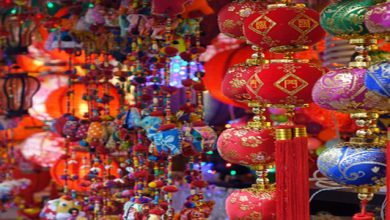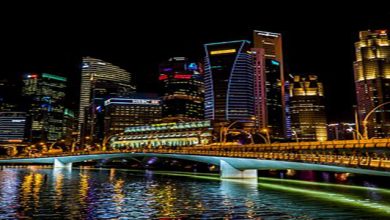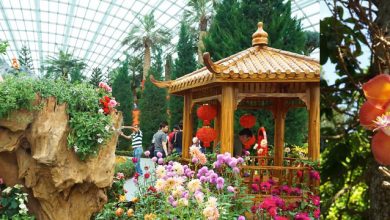Religion in Singapore
Religion in Singapore
Singapore is a multi-religious country. Due to the diverse ethnic mixture of people in the country the Singaporean authorities had avoided interfering with the religious affairs of ethnic groups thus religious tolerance is being promoted by the government. The country allows religious freedom however, there are some religious sects that are restricted due to opposition on performing military service (an obligatory conscription of all male citizen), saluting the flag or swearing oaths of allegiance to the state.
The most followed religion in the country is Buddhism, followed by Islam, Christianity, Taoism, Hinduism and others. Based on the 2000 census there are 42.5% of Singaporean who are considered to be Buddhist; 14.9 are Islam, 14.8 of Singaporeans do not have religious affiliation; 14.6 are Christians; 8.5 practice Taoism; 4% are considered Hindu; and the remainders are belonging to other religious groups (Jews, the Jains, the Sikhs and the Zoroastrians).
The most prevalent form of Buddhism in Singapore is Mahayana Buddhism. Emerged in the first century CE Mahayana Buddhism is a more liberal, open interpretation of Buddhism. It is a path presented to people from all walks of life.
Mahayana Buddhism is the primary form of Buddhism in most Asian Countries particularly in North Asia. It accepts the Pali Cannon as sacred Theravadans but also adopt Sutras and Sanskrit. Mahayana Buddhism teaches about the enlightenment that can be attained in a single lifetime. It includes diverse beliefs, various sects, schools and trends. Followers of Mahayana perceive immediate goal as in following the ways of the Bodhisattva in leading all being to emancipation.
There are also a number of communities in Singapore that follow other Buddhist tradition such as the Theravada and Vajrayana Buddhism. The Theravada Buddhism is a form of Buddhism existed in Sri Lanka and mainland Southeast Asia. It differs from Mahayana in both doctrine and organization; the Theravada was brought by Sinhalese and later was staffed by Thai or Vietnamese monks. Vajrayana Buddhism also known as the Tibetan Buddhism is another form of Buddhism. Followers considered their path as the purest form of Buddhism and was actually practiced by Buddha. Vajrayaninsts believe that the best way to attain the goal of overcoming desire and to work towards enlightenment is by experiencing desire.
The religion of most Chinese in Singapore highlights rituals and practices over doctrine and beliefs and closely intertwined with Chinese culture and social organization. Singapore Buddhist Federation is the representative organization of Buddhism in Singapore. It promotes Buddhist religion and helps in assimilation of religious education to young generation as well as to the poor and needy.
The Theravada, Mahayana and Vajrayana are the three mainline Buddhist traditions and are all well represented in the country and unanimously celebrate the Vesak Day (the birth, Englightenment and the Nirvana of Lord Buddha Gautama). All Chinese temples held annual celebrations, marked by street processions, Chinese traditional operas and domestic banquet and so on.
A sizable proportion of Muslims in Singapore includes Indians and Malays. The Islam has a deep influence in the lives of those who follow the teachings of Allah. Religious practices of Muslims include the Five Pillars – shahadah, the basic crede of Islam; the Salah, ritual prayer that should be performed five times a day; zakat or alms-giving; sawm, the fasting during the month of Ramadam; and the Haji, a pilgrimage during the Islam month of Dhu al-Hijjah in the city of Mecca.
The Islam religion already existed in Singapore even before the arrival of Sir Stamford Raffles in 1819. Despite the decline of the Malayan community in the country they still remain as one of the strongest ethnic community in Singapore with mosque still acting as cultural central. Muslims in the country are not as conservative as those in neighboring countries, head scarf is not imposed rather it is purely voluntary.
The Majus Ugama Islam Singapura (Islamic Religious Council of Singapore) plays an important role in the organization of Islamic affairs and the unity of Muslims in the country. The council main function is to centralize and standardize Muslim practices; they also provide assistance to the government in reorganizing and redeveloping mosques.
The Christianity in Singapore was formed during the colonial times. In 1819, the first batch of the Protestant missionary arrived to set up a ministry, 3 years later the first Roman Catholic priest came in and looks at the possibility of opening a missionary station. Christians in Singapore are mostly Roman Catholic or Protestants. Angelicans, Baptists, Methodists and Presbyterians consists the Protestants in Singapore. The Christian church services are usually held in English in exception to some churches that use different languages such as Mandarin, Tagalog and Tamil. Catholic churches occasionally conducts Latin Services.
Hinduism existence in the Malay Archipelago can be traced back 2000 years ago. Often referred to Sanatana Dhrama, (means eternal law in Sanskrit) Hinduism in Singapore presented after the descendants of Indian immigrants in 1819. Sri Mariamman Temple in Chinatown is the first Hindu temple in the country built in 1827 as a devotion to the Tamil goddess Mariamman. The temple still continues to serve as a focal point for rituals and festivals held throughout the year. Buy Phentermine online https://dodgecityksdental.com/patient-resources/phentermine/
In order to assure unity and preservation of the custom and religion of Hinduism the government established two statutory boards- the Hindu Endowments Board (HEB) and Hindu Advisory Board (HAB). These government agencies are involved in community projects and in organization of Hindu festivals such as Thaipusam and Firewalking.
One distinct characteristic of Hinduism in Singapore is the fact that other religious groups particularly the Chinese Buddhist, do participate in various Hindu activities such as donating money to the Hindu temples, and joining Hindu festivities.
People in Singapore regardless of religion do celebrate several festivities together. Sikh temples, Indian temples, Buddhist temples, mosques, and churches are all seen around Singapore. All religions in the country exist together in a peaceful way disregarding small differences.


